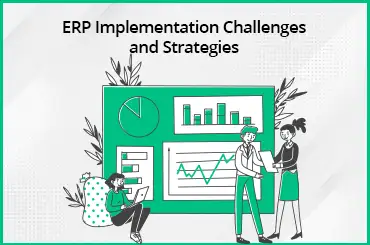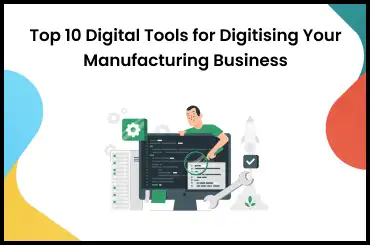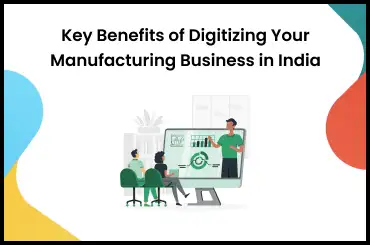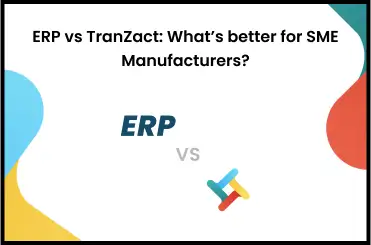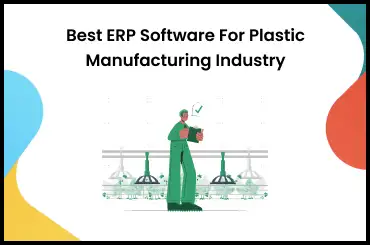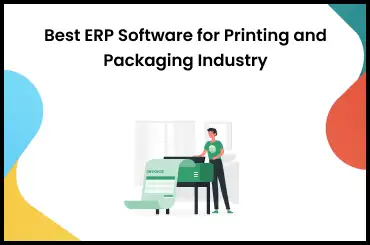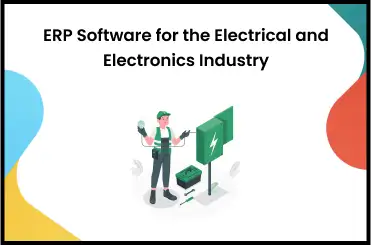The role of online ERP software in business management has become very important. Online ERP systems can help businesses achieve productivity, flexibility, and smooth collaboration with other businesses. In this article, we discuss what online ERP software is and, more importantly, how it is different from its traditional options.
What Is Online ERP?
The concept of online ERP software, or Enterprise Resource Planning, is based on using software to easily manage and connect a company's internal and external data. Unlike traditional systems, online ERP uses cloud-based technology to store information in a central database, providing quick access for multiple departments and functions.
This method decreases errors and promotes improved collaboration among multiple teams. One of the unique features of online ERP is low cost. By switching to this online solution, businesses can enjoy better features without the financial stress of high monthly fees.
How Does Online ERP Software Work?
Online ERP software (Enterprise Resource Planning) is a complete solution for businesses based on cloud technology. It functions by automatically linking different technologies through high-speed internet networks. As it runs online, this system removes the manual effort of managing security updates. The service provider takes charge of this task. The user experience is made simpler to the point where the primary focus for the team becomes logging in and using the system instead of dealing with complex security measures.
Benefits of Online ERP
Here are some of the common benefits of using online ERP software:
- Easy Access: Online ERP systems offer access through the cloud anytime, anywhere, allowing users to connect and collaborate in real-time.
- Affordable: Reduced upfront costs and the absence of hardware investments make online ERP a financially appealing choice for businesses of all sizes.
- Real-time Updates: Quick and regular data updates make sure that all users can access the latest information, promoting informed decision-making.
- Security: Providers handle security updates, providing the availability of the most recent security measures without requiring the user to perform complex security tasks.
- Automatic Updates: Regular and automatic software updates by the provider make sure that the system remains updated with the latest features and developments.
Components of Online ERP System
The number of modules offered by online ERP software is different from industry to industry. Apart from specific financial and accounting functions, here are some of the most common components of online ERP software:
- Project Management
- Supply Chain Management
- Customer Relationship Management (CRM)
- Human Resources
- Warehouse Inventory Management
- E-Commerce Integrations
- Business Process Automation
- Reporting and Business Intelligence
Online ERP vs. On-Premises ERP
Choosing online ERP over on-premises ERP is a wise move for businesses. Online ERP systems are easy to use. Customization allows users to access valuable data from anywhere with an internet connection. This is highly useful in the context of remote work. Moreover, various free online ERP software reduces money and infrastructure or hardware requirements, which stands out compared to on-premises ERP, particularly for smaller companies.
Scalability is another key advantage of free online ERP software for small businesses that can easily adjust to growing data volumes and business demands. The automatic updates and maintenance features of online ERP help businesses always stay up-to-date with the latest features and security measures. On the other hand, a service provider installs and maintains on-premises ERP software, involving upfront investment, networking, and storage. The company bears additional costs for maintenance.
Overall, online ERP offers businesses safety, flexibility, and value for money, making it the ideal choice.
Challenges of Online ERP Software
Apart from advantages, there are some challenges when you buy ERP software online:
- Security Issues: Managing sensitive data in the cloud requires high-level security measures against unauthorized access.
- Internet Connection: Depending on internet connectivity, it can impact system performance and operation during network issues.
- Customization Limitations: Online ERP solutions may have limitations in terms of customization compared to on-premises alternatives. For example, third-party providers manage Cloud-based ERP solutions, and users may have limited access to the system's structure or code.
- System linking: Linking online ERP with existing systems can be complex; it needs a lot of time and smooth coordination for maximum functionality.
- Data transfer Challenges: Moving data from old systems to the online ERP platform can be challenging. It requires careful planning to avoid delays and disturbance in ongoing tasks in different departments.
Online ERP Pricing
Online ERP pricing changes based on the chosen plan, user licenses, and additional features. Typically, it follows a subscription-based model, allowing businesses to pay a monthly access fee. Common pricing structures include multiple plans suited to different business sizes, with costs increasing for higher features and user capacity.
Some providers offer flexible options, allowing businesses to adjust resources as needed. It's important to consider additional costs for customization, training, and potential application fees. Check out TranZact’s pricing plans.
Best ERP Software | TranZact
Explore the best solution for your business's ERP needs with TranZact. Discover detailed information about the best online ERP software designed to improve profits and boost operations. TranZact offers a user-friendly platform, powerful features, and a scalable approach, offering an interface that fits your business objectives. Take advantage of TranZact's creative solutions for successful business management.
FAQs on Online ERP
1. What is Online ERP, and how does it operate differently from traditional ERP systems?
Online ERP, or Enterprise Resource Planning, is a software solution that combines various business processes and functions into a single system accessible through the Internet. Unlike traditional ERP systems that are often installed on-premises, online ERP runs on cloud-based platforms.
2. What are the advantages of using an Online ERP system for businesses?
Using an Online ERP system offers many advantages, including improved productivity, smoother processes, and quicker decision-making capabilities. It allows real-time collaboration among teams, provides secure data storage in the cloud, offers automatic software updates, and allows scalability to support business growth.
3. How secure is sensitive business data in an Online ERP system?
Security is a top priority for Online ERP providers. These systems use strong security protocols, secure data centres, and regular security updates to protect sensitive business information. Furthermore, online ERP vendors use strict access controls, authentication measures, and data backup procedures. You can also sign up for an online ERP software demo to make sure it meets all the security standards.
4. Can Online ERP systems be customized to meet specific business needs?
Yes, online ERP systems are designed to be flexible and customizable. Most providers offer a range of modules and setup options that can be adjusted to suit the unique requirements of different industries and business processes. This flexibility allows businesses to design an ERP solution that aligns with their specific workflows, guaranteeing productivity and meeting the organization's changing needs.
5. How does Online ERP contribute to cost savings for businesses?
Online ERP systems contribute to cost savings in several ways. Firstly, they eliminate the need for significant upfront investments in hardware and infrastructure since the software is hosted in the cloud. Additionally, businesses can benefit from reduced IT maintenance costs, as the responsibility for system updates and maintenance lies with the ERP provider.
6. Can Online ERP systems work with other business applications and software?
Yes, most online ERP systems are designed to connect with various business applications and software. These capabilities allow businesses to connect their ERP system with tools such as CRM (Customer Relationship Management), e-commerce platforms, and third-party analytics tools.







